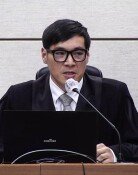Unemployment Grows Unabated
Korea`s unemployment outlook continues to worsen as forecasts for the countrys economic growth this year have been slashed to just over 3% from the previous 5% range.
The Korea National Statistics Office (NSO) yesterday released its report, Employment Trend for June 2003, in which the nationwide payroll figure stood at 22.383 million, down 0.6% or 132,000 year-on-year.
The employment rate has grown steadily on a month-to-month basis since May 1999. However, the increase rate shrank by seven-tenths of a percent in April this year, contracted fourth-tenths in May, and fell further in June.
The number of unemployed was up 1.5% in June from a month earlier, totaling 755,000, boosting the unemployment rate by one-tenth of a percentage point to 3.3%.
Traditionally, the number of unemployed has decreased about 4% in the month of June from May, while the unemployment rate drops by 0.1%, said Seon Ju-dae, head of Social Statistics Bureau at NSO. He also noted, An increase in unemployment in June is uncommon.
The increase in unemployment is more conspicuous when excluding seasonal factors.
The unemployment rate, adjusted for seasonal factors, has been up for four consecutive months, posting 3.1% in March, 3.2% in April, 3.4% in May, and 3.6% in June.
The number of those who gave up seeking employment, which is not included in the statistics, has soared as well.
Those who tried but failed to find a job during the past year and finally gave up are estimated to be 87,000 in June, a 20.8% year-on-year jump.
It is reported that while the working-age population (15 years old and above) has increased by 378,000 over last, the economically active population decreased by 19,000 from 23.157 million to 23.138 million during the same timeframe.
Employment prospects for the second half of this year are even gloomier.
The unemployment rate tends to lag behind economic conditions by three to six months. Therefore, the recent grim employment rates are attributed to the fact that economic indicators for the second quarter were the worst they have been since the late-1997 financial crisis.
Kwang-Am Cheon iam@donga.com






![“설거지해도 그대로”…냄비 ‘무지개 얼룩’ 5분 해결법 [알쓸톡]](https://dimg.donga.com/c/138/175/90/1/wps/NEWS/IMAGE/2026/01/15/133164664.3.png)
